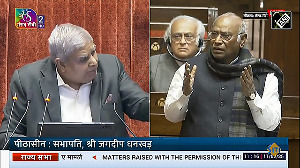'It feels great to carry on this musical tradition.'

Chandrika Tandon made history at the 67th Grammy Awards, winning a Grammy in the Best New Age, Ambient, or Chant Album category for her groundbreaking album, Triveni.
The award honored Tandon's exceptional collaboration with Grammy-winning flutist Wouter Kellerman and cellist Eru Matsumoto -- a fusion of artistic mastery that has captivated global audiences.
"This Grammy win motivates me to think even more intentionally about the healing power of music as I work on the other projects I have on the way," Chandrika, who is also a renowned philanthropist, tells Rediff.com US Contributing Correspondent Abhijit J Masih.
How did it feel to hear your name announced as a Grammy winner, and what was going through your mind at that moment?
It was truly surreal.
After Triveni was announced as the winner, the hall erupted with claps and shouts.
All of us musicians really supported each other with instant and clear abandon.
I felt a shared sense of a loving community.
How do you feel about representing Indian classical music on a global stage like the Grammys?
As a global citizen, and as someone who has never acknowledged boundaries, I am thrilled to have such a grand stage to showcase the music that has brought me so much joy and healing.
The wonderful thing about where we are now is that Indian music, mantras and traditions are much more understood and accepted.
It feels great to carry on this musical tradition.

Your red carpet appearance was stunning! Can you tell us about the outfit you chose and what it meant to you?
This might be the first time anyone has ever asked me to speak about my clothing, but this is a great place to start!
My outfit at the Grammys was a gown from Indian designer Manish Malhotra.
I chose it because it reflected the Indian tradition of weaving and the use of vibrant colour, which was the mood I wanted to set for myself.
How do you think winning a Grammy will impact your career and the visibility of Indian classical music globally?
I expect that winning the Grammy will give more visibility to Triveni and also to chanting mantras, which is already gaining popularity.
At a time when the whole world struggles with mental well-being, if this album can help some people improve their mental health; it will be a worthwhile endeavor.
This Grammy win motivates me to think even more intentionally about the healing power of music as I work on the other projects I have on the way.

Who would you like to thank or acknowledge for supporting you on this journey to the Grammys?
There are so many people to thank, starting with all my masters that shared their musical and spiritual gifts with me.
I would like to thank Wouter and Eru, my collaborators, because their extraordinary talents played a big role in making this album what it is.
Finally, thank you to so many people in the music and Grammy communities that were so encouraging and supportive as we made the album.
Now that you've achieved this incredible milestone, what's next for you? Are there any new projects or collaborations in the works?
I am currently working on my next album, which is called Soul Ecstasy.
It is a more traditional album and is the Hare Rama, Hare Krishna mahamantra composed in 8 ragas.
To me, the Hare Rama, Hare Krishna mahamantra is ecstasy.
The Bhakti movement was built on this mantra, and Swami Srila Prabhupada's Hare Krishna movement was built on this.
I was also recently appointed as artist-in-residence with the Young People's Chorus of New York, a world-renowned multicultural youth chorus composed of hundreds of New Yorker school children from all walks of life.
Together, we will create very specific music for young voices, to inspire, to heal, and to impart some of the ancient wisdom that traditions have embraced for centuries.
Besides those projects, invitations for future collaborations are pouring in, and I am eagerly reviewing them to decide which will be my next adventure.
Feature Presentation: Ashish Narsale/Rediff.com











 © 2025
© 2025